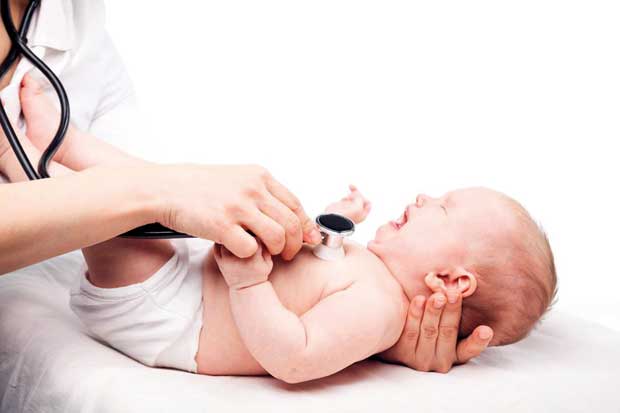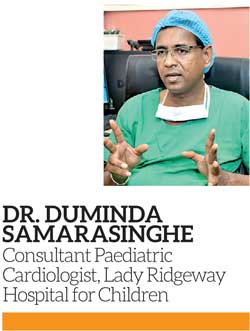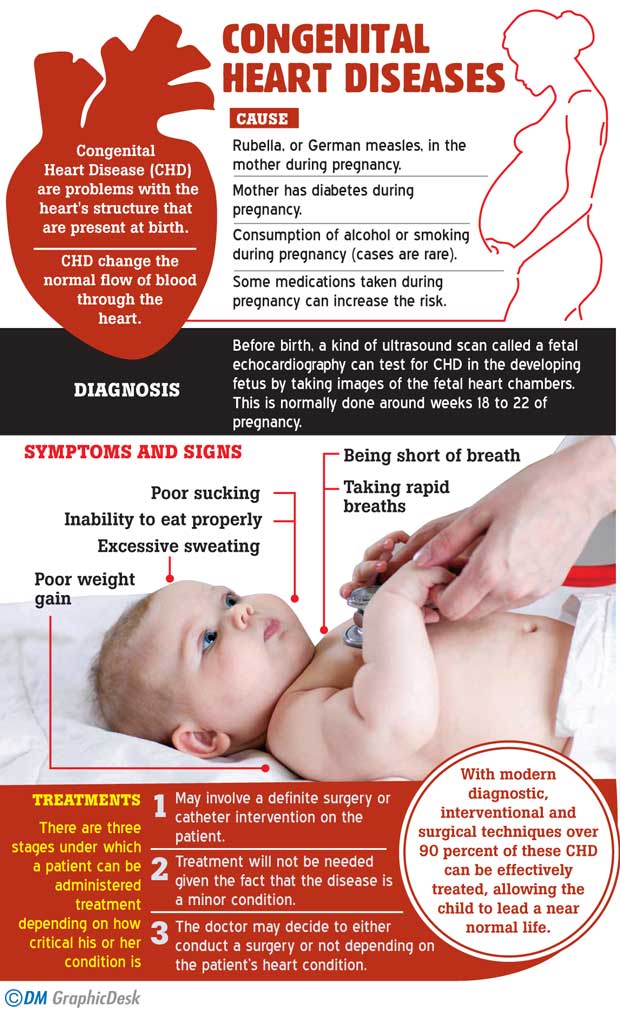Reply To:
Name - Reply Comment

 Have you ever listened to the rhythmic lub-dub of your heart beat, pondered over how it functions or the root causes that may lead to various heart related health problems; including those that fall under the category of Congenital Heart Defects? The Health Capsule spoke to Consultant Paediatric Cardiologist, Department of Paediatric Cardiology, Lady Ridgeway Hospital for Children (LRH), Dr. Duminda Samarasinghe; in an attempt to comprehend the intricacies behind Congenital Heart Defects.
Have you ever listened to the rhythmic lub-dub of your heart beat, pondered over how it functions or the root causes that may lead to various heart related health problems; including those that fall under the category of Congenital Heart Defects? The Health Capsule spoke to Consultant Paediatric Cardiologist, Department of Paediatric Cardiology, Lady Ridgeway Hospital for Children (LRH), Dr. Duminda Samarasinghe; in an attempt to comprehend the intricacies behind Congenital Heart Defects.
Dr. Samarasinghe introduced the topic by defining that Congenital Heart Defects are abnormalities in the heart evident in the patient since birth. According to him, heart diseases can be listed under two categories. The first falls under the category of congenital heart defects and the second type is acquired heart diseases which is acquired at a later stage in life. For an instance, diseases such as rheumatic fever or coronary artery disease are labeled as acquired heart diseases. Stating that congenital heart defects are currently indicating a slight rising trend among patients, he said that this is mainly because the detection of such problems have become more evident at present compared to earlier. “Currently the patient detection is more evident thanks to the modern health care facilities we have including qualified paediatricians and Paediatric Cardiologists covering most parts of the country. Paediatric cardiologists are available in Jaffna, Anuradhapura, Kandy, Kurunegala, Galle and Colombo. So, patients are being diagnosed and referred early. Therefore, the number of patients we handle has become more compared to earlier” Dr. Samarasinghe said.

Further explaining the nature of congenital heart defects, he said that these heart defects are very often hereditary by nature. If the parents have a congenital heart defect or a sibling is diagnosed with a congenital heart condition, then the risk level of inheriting a similar heart defect is slightly high in a patient. In terms of a percentage, a one percent increase may be witnessed in the general population where six to eight per thousand individuals will be affected by a congenital heart condition. However, this rate can rise up to ten percent if there is a recorded family history where a member has been affected by a similar condition.
Root Causes
“If the mother has diabetes during pregnancy or if the mother takes certain drugs such as high doses of steroids, then the possibility of the baby being prone to a congenital heart defect is high. Also, the consumption of alcohol or smoking during pregnancy (cases are rare) and rubella infection during pregnancy can cause congenital heart defects in the baby” says Dr. Samarasinghe. In the case of diabetes, babies are vulnerable to develop a heart disease if the mother is going through uncontrolled diabetes. Thus, unless the diabetes is controlled with insulin and other drugs, there is a chance that the baby may develop a congenital heart condition. “If the diabetes is properly controlled during pregnancy, the chances of developing such conditions are comparatively less. Also, there is no evidence to support that the mother’s food patterns could play a role in giving rise to such diseases” he added.
Red flag signs to watch for!
First if a doctor examines a child and detects a murmur in the heart, the patient will be referred to a paediatrician for further examination. It should be noted that a murmur can be detected only by a doctor. Also, if the child gets repeated lower respiratory tract infection which is a condition similar to pneumonia, it could be a possible symptom that the child is having a congenital heart condition. Also repeated attacks of pneumonia may be another indication of a congenital heart defect. Being short of breath, taking rapid breaths, excessive sweating, inability to eat properly, poor sucking and poor weight gain are red flag signs parents should look for in their children.

Diagnosing congenital heart defects
If a foetal echo is conducted before birth, it is possible to detect early in case there is any congenital ailment. According to Dr. Samarasinghe, a foetal echo is an ultra sound scan of the baby while the baby is still in the womb; ideally conducted between 18- 22 weeks. A foetal echo can detect most of the major deformities. Additionally, an Echocardiogram is an ultra sound examination of the heart which helps diagnose if there is a problem in the heart.“There is a 99.9 % chance to make accurate diagnosis using an echocardiogram. Sometimes to gain additional information concerning the condition, further investigation of the patient’s health condition may be needed. It should be noted that the echocardiogram is the main diagnostic tool that helps diagnose congenital heart conditions in a patient” Dr. Samarasinghe added.
Treatment
There are three stages under which a patient can be administered treatment depending on how critical his or her condition is. “The first treatment method may involve a definite surgery or catheter intervention on the patient. Under the second method, treatment will not be needed given the fact that the disease is a minor condition. Under the third category the doctor may decide to either conduct a surgery or not depending on the patient’s heart condition.
Since certain heart conditions that are minor may heal on its’ own, such conditions can be left untreated life long without any side effects. Patent Foramen Ovale (PFO), tiny Patent DuctusArteriosus (PDA), small Ventricular Septal Defect (VSD), mild narrowing of vessels including tiny holes in the heart can be left untreated depending on the location of the defect” he added.
Explaining the function of a catheter intervention, he explained that the doctor will pass a small catheter through the leg to the heart and manipulate the catheter to perform various actions such as valve openings in the heart. However, depending on how critical the condition is, more complex congenital conditions such as certain holes including narrowing of vessels in the heart may be subjected to an open heart surgery. Cases are often very individualistic since they depend upon the condition of each patient. Therefore, he added that such patients are treated depending on the nature of the defect they have and based on how critical the condition is.
“Rarely a patient will need to be under medication for a long time. In most cases a catheter intervention or surgery would suffice. It is very rarely that patients are prescribed long term drugs. However, patients who have had a catheter intervention or open heart surgery need to maintain a long term follow up on their health condition through regular checkups mainly to watch for any possible side effects or complications. It should also be noted that not all congenital heart defects are life threatening” he added.
Awareness
“Awareness concerning congenital heart defects have increased over time. If parents visit us at LRH, then they will be definitely aware whether their child is in need of a surgery or not. The issue is with those who have not visited us and those who are left at home without being diagnosed.
We recently commenced the ‘Little Hearts’ project which aims to improve facilities for children with heart diseases in Sri Lanka. We need to design a proper cardiac complex in order to carry out our work more smoothly at the LRH. This is a project to construct and commission a ten storey Cardiac and Critical Care Complex at the LRH.At the moment we do nearly thousand surgeries and 600- 700 catheter based interventions at LRH. With this facility coming in, we should be able to do about two thousand cardiac surgeries and thousand catheter interventions. The Sri Lanka College of Pediatricians are currently spear heading this project. We need to raise Rs. 2 billion and so far, we have collected Rs. 120 million. The Government has pledged to donate Rs. 300 million to commence work with the construction of the new facility and the Sri Lanka Navy is currently carrying out the construction work. Donors are welcomed to contribute and their generosity is much appreciated by us” he said.
Pics by Kushan Pathiraja
